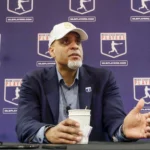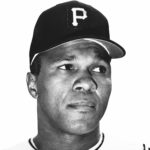David Clyde, the iconic Texas Rangers hurler who helped put fans in the seats at Arlington Stadium from 1973 through 1975, when the late Bob Short ran the team, now has trouble deciding how he’s going to pay his electric bill each month.
Fellow pitcher Rich Hinton, who was on the Rangers’ roster in 1972, has never had health coverage.
And Patty Hilton, the widow of the late Dave Hilton, a Uvalde native who attended Rice University before playing for the San Diego Padres, doesn’t receive spousal benefits.
I thought of all three individuals after learning that, before he recently signed a 13-year contract with the Philadelphia Phillies valued at $330 million, onetime free agent Bryce Harper rejected a $300 million offer from his old club, the Washington Senators, because “about $100 million of that contract was deferred till I was 65 years old.
“What does that do for me?” he asked ESPN The Magazine. “What does that do for my family?”
Well, Bryce, for starters, assuming you didn’t squander $200 million before then, it would give you and your loved ones some financial security in retirement.
Clyde, Hinton, and Hilton wish they could say the same.
There are 636 men and their families who played Major League Baseball (MLB) who are being denied pensions by both the league and the union representing the current players, the Major League Baseball Players’ Association (MLBPA), because of an error the union committed 38 years ago.
In order to avert a threatened 1980 walkout by the players, MLB made the following sweetheart offer to union representatives: going forward, all a post-1980 player would need to be eligible to buy into the league’s premium health insurance plan was one game day of service; all a post-1980 player would need for a benefit allowance was 43 game days of service. At the time, the threshold was four years to be vested in the pension plan.
The problem was, the union failed to insist on retroactivity for all those players like Clyde, Hinton, and Hilton, who all had more than 43 game days but less than four years of service.
Thanks to the late Michael Weiner, the former MLBPA executive director, the league and union partially remedied this situation in April 2011. The pre-1980 players alive at the time were each awarded non-qualified payments of $625 per quarter, up to $10,000, for every 43 game days of service the man had. However, when the man passes, the payment passed with him.
That’s why Patty Hilton now gets squat.
The league – which I concede does not have to address this matter unless the union broaches it in collective bargaining negotiations — recently announced that its revenue was up 325 percent from 1992 and that it has made $500 million since 2015. What’s more, the average value of each of the 30 clubs is up 19 percent from 2016, to $1.54 billion. And the 30 club owners recently wrote a $10 million check to the National Baseball Hall of Fame in Cooperstown.
The owners chose museum relics rather than retirees.
To date, the MLBPA has been loath to divvy up any more of the collective pie. Even though the players’ welfare and benefits fund is worth more than $3.5 billion, MLBPA Executive Director Tony Clark has never commented about these non-vested retirees, many of whom are filing for bankruptcy at advanced ages, having banks foreclose on their homes and are so sickly and poor that they cannot afford adequate health care coverage.
According to the IRS, a current MLB retiree can receive a pension of up to $220,000. Even a post-1980 player who only has 43 game days of service credit receives a minimum pension of $3,589 at the age of 62, assuming he was called up to “The Show” and stayed on the active roster from August 15 to October 1.
Infielder Jimmy Driscoll was on that 1972 Rangers team with Hinton. When he got his first non-qualified payment eight years ago, you know what he did with it? He repaired his boiler.
“We’re the lost boys of summer,” says Driscoll.
Considering that Clyde. Hinton, Driscoll, and Hilton all endured labor stoppages and stood on picket lines so someone such as Harper could reap the benefits of free agency, it is anathema to me why the union doesn’t do more for these men.
One possible answer is a quote attributed to the founder of the American Newspaper Guild, the late Haywood Broun. “Sports,” he once wrote, “does not build character. It reveals it.”
What does that say about the folks now running our national pastime?
A freelance magazine writer, Douglas J. Gladstone is also the author of two books, including “A Bitter Cup of Coffee; How MLB & The Players’ Association Threw 874 Retirees a Curve.”
Author Profile
Latest entries
 MLBDecember 14, 2022A Tale of Two Wyomingites
MLBDecember 14, 2022A Tale of Two Wyomingites MLBJuly 2, 2022Asking for Accountability From a POC Isn’t Bigotry
MLBJuly 2, 2022Asking for Accountability From a POC Isn’t Bigotry MLBFebruary 5, 2022A Valentine’s Appeal to Tony Clark, Executive Director, Major League Baseball Players’ Association
MLBFebruary 5, 2022A Valentine’s Appeal to Tony Clark, Executive Director, Major League Baseball Players’ Association MLBJanuary 19, 2022MLB: Pre-1980 Players Without a Pension List Now Stands at 525
MLBJanuary 19, 2022MLB: Pre-1980 Players Without a Pension List Now Stands at 525
